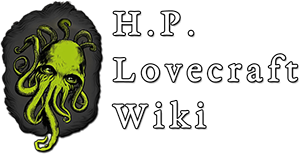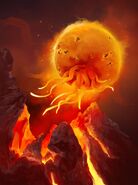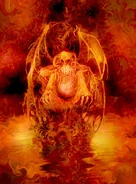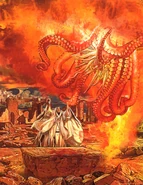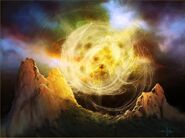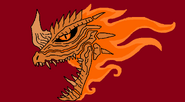| “ | He hung motionless in a black, forbidding sky and at first thought he was suspended somewhere in the intrasolar deeps much closer to the Sun than on Earth. But then he realized that the dully gleaming orb which floated before his dreaming vision was not the Sun. Ugly dark blotches mottled the dull orange surface and great columns of spinning flame arced around the rim.... [He watched] the titan sunspots drift slowly across the hideous disc, at times growing larger and merging into great gaping chasms in the fiery atmosphere, while at others dwindling almost to nothingness.... Something was stirring deep within that fiery atmosphere; something monstrous that roared an insatiable anger against the chains of the Elder Gods which had bound it there for an eternity.... Unable to resist, utterly powerless to control his movements, he was diving headlong towards that ravening chaos, that age-old intelligence which was Cthugha. | „ | |
| ~ John Glasby , "The Dark Mirror" |
![]() Cthugha is a fictional deity in the Cthulhu Mythos genre of horror fiction, the creation of August Derleth. He first appeared in Derleth's short story "The House on Curwen Street" (1944).
Cthugha is a fictional deity in the Cthulhu Mythos genre of horror fiction, the creation of August Derleth. He first appeared in Derleth's short story "The House on Curwen Street" (1944).
Description
Cthugha resembles a giant ball of fire. He is served by the Flame Creatures of Cthugha. Fthaggua, regent of the fire vampires, may be his progeny. He has at least one other known progeny, the being known as Aphoom-Zhah.
In Derleth's version of the Cthulhu Mythos, Cthugha is a Great Old One, an elemental spirit of fire opposed to the Elder Gods.
Appearances
In August Derleth's short story AWD: "The Dweller in Darkness" (1944), the protagonists attempt to summon Cthugha to drive an avatar of Nyarlathotep out of a forest in northern Wisconsin.
Legacy
- In the game “Tokyo Afterschool Summoners”, there is a character based on Cthugha who takes the form of an anthropomorphic dragon. His design and backstory contain numerous references to the original Cthugha.
- A cultivar of carnivorous plant have been named after Cthugha.
- The novel Ghouls of the Miskatonic by Graham McNeill features a war veteran who summons Cthugha to Earth to put a stop to a murderous cult of Cthulhu worshipers.
